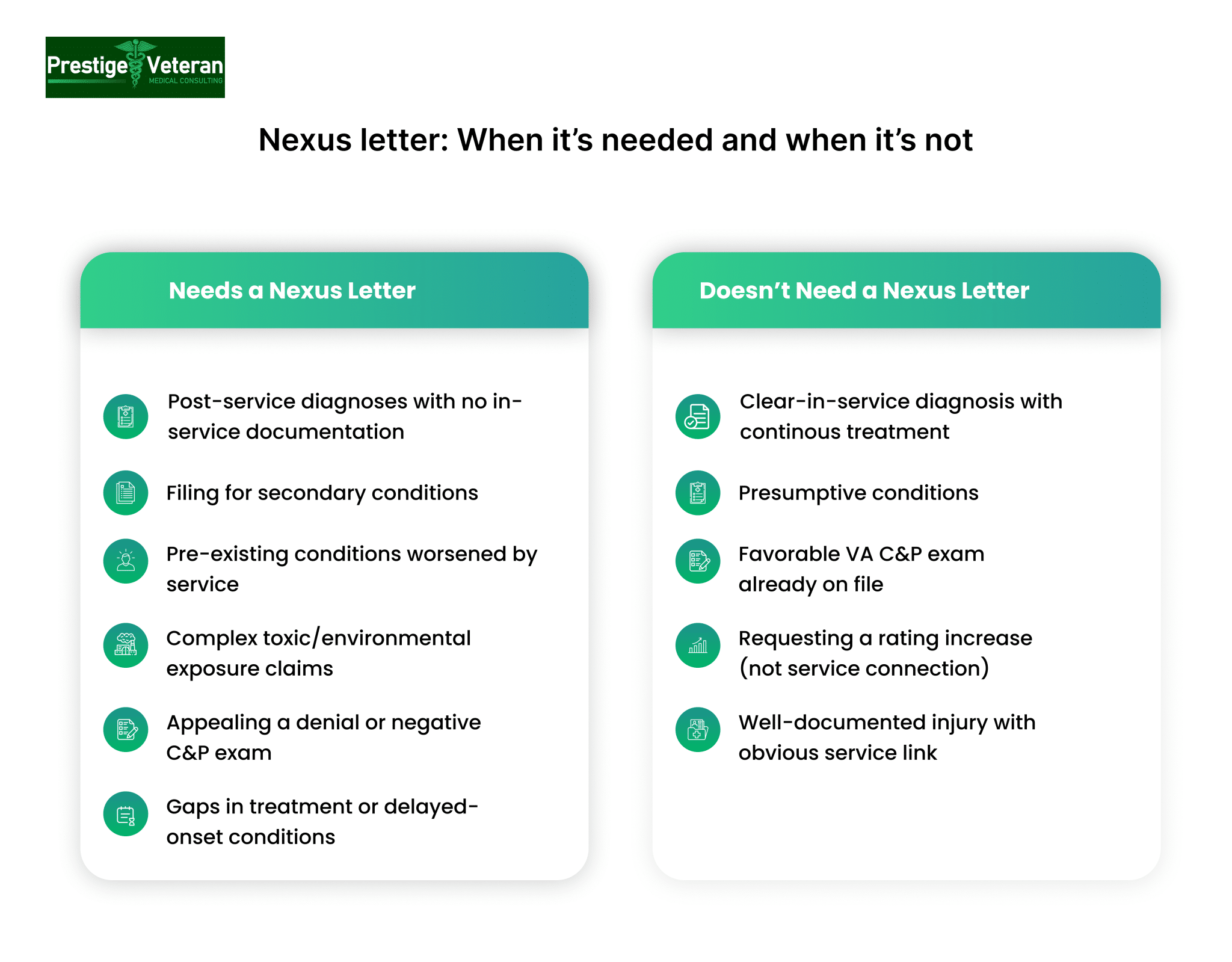Updated on 26 August, 2025
Veterans navigating the complexities of the VA disability system often find themselves grappling with the question of whether they need a Nexus Letter. Leah Bucholz focuses on the significance of Nexus Letters, also known as independent medical opinion letters, shedding light on their role in establishing a link between a veteran’s injury or illness and their military service.

Table of Contents
Defining the Nexus Letter
A VA Disability Nexus Letter or an independent medical opinion is written by a qualified healthcare professional, such as a physician, psychologist, or nurse practitioner, to establish a clear link between a veteran’s current medical condition and their military service. It explains, in precise medical terms, that your condition is “at least as likely as not” connected to events, exposures, or injuries you experienced while serving.
While the VA does not always require a Nexus Letter, it can be helpful when your service treatment records are incomplete, your condition developed years after service, or the VA initially denies your claim due to “no service connection.” Medical experts carefully review your records, analyze your diagnosis, and provide an evidence-based opinion that strengthens your case.
For many veterans, a strong Nexus Letter can be the deciding factor in securing the VA disability benefits as VA raters weigh the adequacy of medical evidence using the VA M21-1 Adjudication Procedures Manual.
Nexus Letters are Not a Mandatory Requirement
It’s crucial to emphasize that Nexus Letters are not mandatory for the VA disability claims. When veterans undergo a Compensation and Pension (C&P) exam, a VA-appointed examiner will issue a medical opinion on the likelihood of the condition being linked to their military service.
However, VA examiners may not always recognize the long-term effects of certain conditions, particularly those that develop years after service. In these situations, a private Nexus Letter can rebut a negative opinion and strengthen the evidentiary record.
Veterans are not obligated to proactively seek an independent opinion, but they may be helpful in some circumstances. For clarification and strategy assistance, it may be beneficial to seek expert legal advice from an accredited legal professional.
Who Needs a Nexus Letter for a VA Disability Claim
Below are situations where a nexus letter can significantly strengthen your case:

1. You have Post-Service Diagnoses and No In-Service Documentation
If your Service Treatment Records (STRs) lack documentation of a diagnosis, but you later develop a related medical condition, a nexus letter can fill the evidentiary gap.
For example, many veterans are diagnosed with obstructive sleep apnea (OSA) years after discharge, even though their STRs don’t mention fatigue, snoring, or breathing pauses. A nexus letter doctor can review your service history and explain contributing factors, such as PTSD-related sleep disturbances, weight changes due to medications, or burn pit exposure.
Other common service-connected conditions requiring medical nexus are:
- Sleep apnea
- Hypertension
- Irritable Bowel Syndrome (IBS)
- Tinnitus
- Certain cancers linked to environmental exposures
Without a nexus letter, the VA may deny your claim for “no service connection” because there’s no obvious in-service documentation tying your diagnosis to military duty.
2. You are Filing for Secondary Conditions
A secondary service connection occurs when one disability is caused or aggravated by another already service-connected disability. These claims almost always benefit from a nexus letter because the VA doesn’t automatically assume the connection. In these cases, a nexus letter shows the “cause-and-effect” relationship.
Examples:
- Migraines secondary to a Traumatic Brain Injury (TBI): A doctor can explain how post-TBI neurological changes cause recurring headaches.
- GERD secondary to PTSD medications: Certain antidepressants and anxiety medications can worsen acid reflux, and a nexus letter can document this link.
- Sleep apnea secondary to depression or PTSD: Mental health disorders often contribute to obesity, insomnia, and disrupted sleep patterns.
In these cases, the nexus letter outlines the medical chain of causation:
Condition A → causes/aggravates → Condition B, supported by scientific literature and your treatment history.
In this case, a medical nexus must explain that the secondary condition is “proximately due to or aggravated by” a service-connected condition under 38 C.F.R. §3.310.
3. You Had Pre-Existing Conditions That Worsened During Military Service
If you had a medical condition before joining the military such as asthma, flat feet, scoliosis, or depression, but your service permanently worsened it, you’ll likely need a nexus letter.
Governed by 38 C.F.R. §3.306, a primary physician writing the nexus opinion can:
- Establish your health baseline before enlistment
- Document the in-service aggravation
- Explain why the worsening of the condition wasn’t just a “natural progression”
Example: A veteran with mild seasonal allergies may develop chronic sinus problems after years of exposure to dust, smoke, or chemical agents during deployment. A nexus letter can detail how service-related environmental hazards permanently aggravated the pre-existing condition.
Without this expert medical opinion, the VA may assume your worsening symptoms would have occurred regardless of service.
4. You Have Complex Toxic or Environmental Exposure Claims
Claims involving toxic exposures or environmental hazards are harder to prove without a medical explanation, especially when your diagnosis isn’t on the VA’s presumptive list under the PACT Act.
A nexus letter can link your toxic exposure to your current condition in these scenarios:
- Burn pit exposure → respiratory disease or chronic sinusitis
- Contaminated water at Camp Lejeune → cancers or liver disease
- Radiation or jet fuel exposure → organ damage
- High-decibel noise environments → hearing loss and tinnitus
Example: A veteran who served at Camp Lejeune between 1953 and 1987 and later developed kidney cancer may need a nexus letter referencing CDC studies linking the contaminated water to increased cancer risks. A well-supported medical rationale bridges the gap between environmental hazards and your current diagnosis.
5. You’re Appealing a VA Claim Denial or a Negative C&P Exam
If your VA claim was denied for “no nexus established” or your Compensation & Pension (C&P) exam produced an unfavorable opinion, obtaining an independent nexus letter can strengthen your appeal.
A strong letter can:
- Correct inaccurate timelines or misinterpreted facts
- Address overlooked lay statements and buddy letters
- Cite credible medical research supporting your VA disability claim
Example: A veteran denied for PTSD due to “insufficient verified stressors” later wins on appeal when a psychologist writes a nexus letter showing how service-related incidents triggered long-term psychological trauma. By directly addressing the VA’s reasoning for denial, the letter becomes a critical piece of evidence.
6. You Have Gaps in Treatment or Delayed-Onset Conditions
Some service-related disabilities don’t appear until years after service, while others go untreated due to stigma, limited access to VA care, remote duty locations, or personal coping strategies. In these cases, a nexus letter can explain the delayed onset by citing relevant research and linking the condition to your time in uniform.
A nexus opinion can help establish a stronger service connection when:
- PTSD diagnosed 10 years after discharge due to avoidance of treatment
- Anxiety from Military Sexual Trauma (MST) documented years later because of shame or trauma
- Chronic back pain untreated for decades, due to remote duty assignments and hence, limited access to VA care
A clinician can review your history and provide a medical rationale showing how symptoms began during or shortly after service but were never recorded or went untreated, which is especially important for mental health claims and long-latency illnesses.
Who Doesn’t Need a Nexus Letter for a VA Disability Claim
While nexus letters are invaluable in many situations, they’re not always necessary. In some claims, your existing records already provide enough evidence to establish service connection.
1. You Have a Clear In-Service Diagnosis and Continuous Treatment
If your condition was diagnosed during service and your medical records show continuous treatment after discharge, a nexus letter usually adds no value.
Example: You fractured your ankle during training, underwent surgery on active duty, and have ongoing orthopedic records showing chronic pain and limited mobility. The VA already has sufficient documentation proving a direct service connection between your active duty and current disability, which makes an additional nexus letter unnecessary.
2. Your Disability Qualifies Under the VA Presumptive Conditions List
For certain illnesses, the VA automatically presumes service connection if you meet location, timing, or exposure requirements under federal regulations.
Common presumptive conditions under the PACT Act include:
- Agent Orange exposure → diabetes, Parkinson’s disease, ischemic heart disease
- PACT Act burn pit exposure → asthma, chronic bronchitis, sinusitis
- Gulf War syndrome → chronic fatigue or fibromyalgia
- Radiation-related cancers
If your diagnosis meets VA’s presumptive criteria, a nexus letter isn’t required as the law itself establishes the connection in 38 C.F.R. § 3.309.
3. You Already Have a Favorable VA C&P Opinion Already in the File
If your VA-appointed examiner has already provided a positive nexus opinion during your C&P exam, and the VA rater accepts it, you don’t need a separate private nexus letter.
Instead, your focus should shift to:
- Ensuring the disability rating is accurate
- Providing updated treatment records
- Completing a DBQ to document the current severity
Duplicating an existing favorable medical opinion rarely improves your claim and can sometimes create inconsistencies.
4. You’re Requesting a Rating Increase, Not Service Connection
If you’re already service-connected and are only filing for a higher disability rating due to worsening symptoms, you don’t need a nexus letter. For example, if you’re already service-connected for lumbar spine strain at 20% but your symptoms have worsened, the VA does not need another nexus letter because the condition has already been linked to your service.
What they do need is updated medical evidence showing how your back problems have increased in severity. Submitting recent treatment notes, therapy notes, a DBQ for Back (Thoracolumbar Spine) Conditions, and lay statements will help demonstrate the current impact on your daily life. The focus is no longer proving that it’s service-connected, but rather how much it now limits you.
5. Your Injury is Well-Documented with Obvious Line-of-Duty Connection
Some injuries are so clearly tied to military service that a medical nexus letter wouldn’t add anything valuable. In cases like these, the VA already has extensive, undeniable documentation linking the condition to your service. Adding a nexus letter would only repeat what is already proven in your service treatment records, combat awards, or hospitalization notes.
Instead, your focus should be on showing the current severity of the condition and how it affects your daily life.
Example: A veteran with a traumatic hearing loss from an IED blast, documented by in-service audiograms, combat incident reports, and award citations for injuries sustained in action. Since the service connection is clearly established, the VA does not need a nexus letter.
How to Get a Nexus Letter for Your VA Disability Claim
Securing a Nexus Letter starts with the right medical professional. The provider should be a licensed and qualified medical professional, like a physician, psychologist, or nurse practitioner who understands both your medical condition and how to connect it to military service. Start by searching “nexus letter doctors near me” who understand VA claim requirements or healthcare providers specializing in writing detailed, evidence-based opinions.
Steps to Obtain a VA Nexus Letter:
- Gather your Service Treatment Records (STRs), C-File, and post-service medical records for review.
- Ask your primary care physician or nexus letter doctor if they can provide an opinion.
- If VA providers cannot assist, consider consulting VA nexus letter doctors near you who work privately with veterans.
- Seek assistance from Veterans Service Officers (VSOs) or VA-accredited attorneys who can recommend trusted medical professionals.
- Ensure the letter includes credentials, medical rationale, and the “at least as likely as not” language.
Many veterans struggle to find doctors willing to prepare detailed medical opinions. That’s where we come in. As an independent medical opinion provider, we specialize in creating thorough, credible letters tailored to VA standards.
For official guidance on disability claims, visit the official U.S. Department of Veterans Affairs website.
Key Elements of a Nexus Letter
A complete, well-reasoned Nexus Letter can bridge the gap between service and disability, giving veterans the strongest chance for a favorable VA decision. Typically, a Nexus Letter includes the following key elements:
- Introduction and Credentials: The medical expert must clearly state their name, specialty, board certifications, and relevant experience. This establishes credibility and demonstrates authority to provide a medical opinion.
- A Review of Veteran’s Records: The letter should reference a detailed review of the veteran’s complete claims file (C-File), treatment records, and any private or VA medical documentation. Mentioning specific dates and documents shows that the opinion is evidence-based.
- Medical History and Condition Overview: A thorough explanation of the veteran’s medical history, symptoms, and current diagnosis is vital. The expert should highlight when symptoms began, how they progressed, and whether they align with military service exposures or events.
- Medical Rationale and Supporting Evidence: Beyond stating conclusions, the expert should provide a clear medical rationale supported by peer-reviewed literature, clinical guidelines, or research studies.
- Statement of Likelihood: The medical nexus letter should conclude with a legally recognized standard such as “more likely than not” or “at least as likely as not,” directly linking the condition to military service.
Challenges of Relying Only on In-Service Evidence
Even when veterans have in-service medical records documenting an injury or illness, their VA disability claims are not always approved. Denials often cite a lack of “continuity of care” or argue that too much time has passed since service. The VA frequently looks for evidence connecting past symptoms to current diagnoses, which can leave veterans without ongoing treatment records at a disadvantage.
In these cases, a Nexus Letter from a qualified medical professional is critical. Such expert opinions explain how service-related events can cause long-term health effects, bridging the gap between military records and present conditions.
Common Myths About VA Disability Claims and Nexus Opinions
Myth 1: In-service evidence guarantees approval.
Many veterans believe that if their service treatment records show an injury, their claim will be automatically approved. For example, a veteran may have documented knee injuries from training in 2005. However, if they didn’t continue treatment after leaving service, the VA might deny the claim, arguing that the condition “resolved” and was not chronic.
In this case, a Nexus Letter from an orthopedic specialist can explain how repeated trauma during service often leads to long-term conditions like arthritis, even if there was a gap in treatment.
Myth 2: Any medical statement is enough.
Some assume that a quick note from a doctor saying “this condition is service-related” will satisfy the VA raters. However, without a detailed explanation, such statements carry little weight. For instance, a general practitioner might write, “The veteran’s back pain is related to service.” Without supporting medical reasoning, the VA often dismisses such opinions as speculative.
A strong Nexus Letter instead might reference imaging studies, medical research on spinal injuries, and detailed explanations connecting the veteran’s deployments to their current degenerative disc disease. This evidence-based approach carries far more approval chances than the generic nexus statements.
Sample Nexus Letter For a VA Claim
The following excerpts illustrate how medical professionals may phrase nexus opinions linking a veteran’s current condition to their military service.
Example 1 (Respiratory Condition)
“In my medical judgment, the veteran’s current diagnosis of chronic obstructive pulmonary disease (COPD) is at least as likely as not (50% or greater probability) related to prolonged exposure to burn pit smoke and airborne particulates encountered during overseas deployment. The absence of other significant risk factors, combined with service records confirming exposure, supports this conclusion.”
Example 2 (Migraines / Headaches)
“After reviewing the veteran’s service medical records, current neurology evaluations, and reported symptom history, it is my opinion that the veteran’s chronic migraine headaches are at least as likely as not related to head trauma sustained during active duty. The persistence of headaches since that documented incident, along with clinical consistency of symptoms, supports a direct service connection.”
Buddy Letters and Their Limitations
While buddy statements can be beneficial in providing firsthand accounts of witnessed events, they cannot replace medical expertise. Most importantly, a lay testimony cannot diagnose or establish complex medical conditions. That’s where a professional Nexus Letter becomes essential, providing the scientific and legal weight needed to win a VA disability claim.
Disclaimer: This article is for informational purposes only and does not constitute medical or legal advice. Veterans seeking guidance should consult with a licensed healthcare provider or an accredited VA attorney/representative.
Closing Thoughts on Nexus Letters
In conclusion, the decision to seek a Nexus Letter is a personal one, influenced by the complexity of the veteran’s case and the need for additional support in establishing the link between their condition and military service. Veterans should work closely with accredited agents, attorneys, or Veterans Service Officers to navigate the intricacies of the VA disability claims process effectively. Ultimately, a well-crafted Nexus Letter can significantly strengthen a veteran’s case, providing the necessary expert opinion to support their pursuit of deserved disability benefits.
FAQs
Who can write a nexus letter?
A nexus letter can be written by a qualified medical professional, such as a physician, psychologist, nurse practitioner, or physician assistant, who provides a clear, well-reasoned medical opinion linking a veteran’s condition to military service.
How much does a nexus letter cost?
A nexus letter typically costs between $600 and $1,500, depending on the provider, specialty, medical record review, and whether an in-person exam is required. Some treating physicians may write them for free.
Can a PA or NP write a nexus letter?
Yes, physician assistants and nurse practitioners can write nexus letters if qualified and able to provide a sound medical rationale connecting the condition to service.
What if my C&P exam was negative?
If your Compensation and Pension (C&P) exam was negative, you can request a Higher-Level Review, file a Supplemental Claim with new evidence, or appeal to the Board of Veterans’ Appeals.
What’s the difference between a secondary service connection and aggravation?
Secondary service connection means a new disability is caused by a service-connected condition, while aggravation means a pre-existing non-service-connected condition was permanently worsened by a service-connected condition.
Do I really need a nexus letter?
You don’t always need a nexus letter, but it can be critical when service records are incomplete, conditions appear years later, or the VA denies your claim for lack of service connection.
Who should write a nexus letter?
The best nexus letters come from licensed medical professionals, often specialists who review your records and provide a detailed, evidence-based opinion linking your condition to service.
What is the purpose of a nexus letter?
A nexus letter serves to medically explain how a veteran’s disability is “at least as likely as not” connected to military service, strengthening the evidence for VA benefits.
Who needs a VA disability nexus letter?
You may need a nexus letter if:
- Your service treatment records lack documentation of your condition.
- You are filing for a secondary condition caused by a service-connected disability.
- A pre-existing condition was permanently worsened by military service.
- You are appealing a denial or a negative C&P exam.
- Your claim involves toxic or environmental exposures not on VA’s presumptive list.
- Your condition developed years after service with gaps in treatment.
Also read: What to Do if Your Doctor Won’t Write a VA Nexus Letter
At Prestige Veteran Medical Consulting, a veteran-owned company, we specialize in Independent Medical Opinions (IMOs) known as Nexus letters.
Our purpose is to empower YOU, the veteran, to take charge of your medical evidence and provide you with valuable educational tools and research to guide you on your journey.
Understanding the unique challenges veterans face, our commitment lies in delivering exceptional service and support.
Leveraging an extensive network of licensed independent medical professionals, all well-versed in the medical professional aspects of the VA claims process, we review the necessary medical evidence to incorporate in our reports related to your VA Disability Claim.
Prestige Veteran Medical Consulting is not a law firm, accredited claims agent, or affiliated with the Veterans Administration or Veterans Services Organizations. However, we are happy to discuss your case with your accredited VA legal professional.













